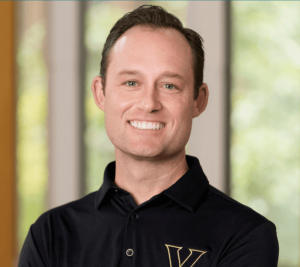By Arial Starks

Joe Wagstaffe
Starting your Executive MBA (EMBA) application may seem daunting or like another long task on your ‘To Do’ list, but with a little preparation and a quiet afternoon, you can be one step closer to achieving your educational and career goals. Joe Wagstaffe, Associate Director of Recruiting and Admissions, Vanderbilt Executive MBA, shares a few pointers for applicants preparing to hit ‘submit’ on their EMBA application.
Stay ready so you don’t have to get ready
Applying to graduate school can be a lengthy process if you are ill-prepared. For working professionals who may not have as much time to dedicate to the application process, it is important to stay ready, so you don’t have to spend as much time gathering all of the items you will need to apply.
Wagstaffe encourages working professionals to keep items like an updated resume on hand, as well as a list of professionals in your network who can serve as a recommender to you. Just having these two resources handy will save an applicant a great deal of time when applying to an Executive MBA program.
“One of the biggest hurdles for working professionals applying to business school is trying to figure out how to make time to apply when they’ve already got a busy life,” Wagstaffe says. “A huge part of working this program into your schedule is time management and efficiency, and having some of the more taxing components of the application ready to go is a great way to incorporate that.”
Review the Executive MBA application requirements
The very first step to applying for any graduate program is to review the admissions requirements for your desired program and learn the different components of the application. Wagstaffe tells us that for the Vanderbilt Executive MBA, a great way to approach the application is by first determining what items you, the applicant, are directly in control of and what items you are indirectly responsible for.
Applicants are directly in control of the online application form, an updated resume, essays, and sending out requests for transcripts and recommendations. “That initial data is what they need to submit their application, to move it from open application to submitted,” Wagstaffe shares.
Wagstaffe adds that the components of the application that applicants are indirectly responsible for include the items that take a little more time, “to go from submitted to completed, complete is where they get their decision, that phase of the process is going to be us receiving the transcripts, recommendations, entrance exam scores, and then completing their interview with Juli Bennett,” Wagstaffe explains.
Know your ‘why’
While you should have the more tangible checklist items ready for the Executive MBA application, you should also be thinking about your ‘why’. Knowing your reason for wanting to return to school and being able to articulate that through essays and interviewing will give you a leg up when it comes to a returned decision.
“The initial part of the application I look at is, just on a surface level, who are you? What’s your experience? What do you bring to the table?” Wagsaffe says. “Our program is unique in that it’s so small with only 50 students. With that, we have to be really intentional with who’s in the room, so the goal is to put together this puzzle of people who have really interesting backgrounds and unique perspectives to contribute to the cohort.”
Knowing your ‘why’ can also keep you motivated and encourage you to progress when things become challenging. One of the first challenges applicants will face is the entrance exam.
“The biggest gap that we see that people have to bridge returning to school and coming into this program is the quantitative part,” Wagstaffe explains. “Understanding the quantitative part and how to sharpen those skills from an entrance exam perspective…that’s the area most people underestimate that they need to work on.”
Overcome imposter syndrome and submit your Executive MBA application with confidence
At any point during the application process, it is important for applicants to remember it is completely fine to have questions and concerns. Wagstaffe ensures that the Vanderbilt EMBA admissions team is there to provide any clarity needed to help set applicants up for a successful application process.
“Ask every question you need to, so that when you hit submit, you know, you’ve done everything you need to do to feel confident in your application,” he says.
Wagstaffe adds that applicants should come into the application process feeling deserving and confident, not allowing imposter syndrome to deter them.
“If you’re considering an Executive MBA and you’ve talked to us and we feel like this could be the right fit, have confidence in hitting ‘submit’ on your application,” he says. “That’s why this program exists- for people who have taken the windier path to earning an MBA. It wasn’t necessarily the right time early on and now they are ready and should feel confident in taking that next step.”
Applications are still being accepted on a rolling basis.